Case Law Details
Santosh Kumar And 2 Others Vs Board of Revenue (Allahabad High Court)
In this case before the Allahabad High Court, the petitioners sought relief regarding a property dispute related to certain plots in Village Kisunpur Ram Chandar, District Rae Bareli. The dispute arose from the late Ram Gopal’s property, who was related to the petitioners.
The petitioners claimed rights based on an unregistered will dated 25.07.2003 allegedly executed by late Ram Gopal. They filed various applications and appeals in this regard. However, it was revealed during the proceedings that the petitioners had produced two different unregistered wills of the same date, attempting to rectify mistakes pointed out by the authorities.
The Court observed that the petitioners had not previously mentioned to any authority or court that they had not filed any unregistered will before the Tehsildar. This claim was raised for the first time during the first appeal, indicating an attempt to mislead the courts.
The Court cited the principles laid down by the Supreme Court regarding the obligations of litigants and the consequences of abusing the court process. It noted that the petitioners had filed false affidavits and concealed relevant facts, ultimately trying to grab the property of a widow. As a result, the Court imposed a cost of Rs. 50,000 on the petitioners for their misconduct and misuse of the legal process.
FULL TEXT OF THE JUDGMENT/ORDER OF ALLAHABAD HIGH COURT
1. Shri Anshuman Singh, learned counsel for the respondent no.9 has filed a short counter affidavit bringing on record the copies of the sale deed and the memo of revision filed by the petitioners, which is taken on record.
2. The learned counsels for the parties state that it would not be necessary to file the detailed counter affidavit or the rejoinder affidavit and the matter may be heard finally, at this stage.
3. Learned Counsel for the petitioners has also filed a certified copy of the memo of revision preferred by the petitioners under Section 219 of the U.P. Land Revenue Act, 1901 (hereinafter referred to as, the Act, 1901) against the order of the Tehsildar dated 21.01.2013, the same is taken on record.
4. Heard Shri Anurag Shrivastava, learned Counsel for the petitioners, Shri Hemant Kumar Pandey, learned Standing Counsel for the State and Shri Anshuman Singh, learned counsel for the respondent no. 9.
5. Present petition has been preferred with the following main reliefs:-
“i) To issue a writ order or direction in the nature of certiorari thereby quashing impugned judgment and order dated 28.3.2024 passed by the opposite party no.1 in Second Appeal No.56 of 2015 as contained in Annexure-14 to the writ petition;
ii) To issue a writ order or direction in the nature of certiorari thereby quashing the impugned judgment and order dated 18.12.2014 passed by the Additional Commissioner (Judicial) Second, Lucknow Mandal, Lucknow i.e, opposite party no.2 in Appeal No.C20141000002607, judgment and order dated 13.10.2014 passed by the Sub-divisional Magistrate, Sadar, Rae-bareli i.e. opposite party no.5 in Case No.233, judgment and order dated 11.3.2014 passed by the Additional Commissioner (Administration), Lucknow Mandal, Lucknow i.e. opposite party no.3 in Revision No.582/2012-13 as well as judgment and order dated 21.1.2013 passed by the Tehsildar Sadar, Rae-bareli ie, opposite party no.5 in Case No.746 which are contained in Annexure-10, 8, 5 & 3 respectively to the writ petition;
iii) To issue a writ order or direction in the nature of mandamus thereby directing the opposite parties no.1 to 6 not to implement the impugned judgment and orders as contained in Annexure-14,10, 8, 5 & 3 respectively to the writ petition;”
6. Learned Counsel for the petitioners has submitted that the petitioner no. 1 is the nephew of late Ram Gopal alias Gopal, petitioner no. 2 is the wife of nephew of late Ram Gopal and petitioner no. 3 is son of petitioner no. 2.
7. It is further submitted that the dispute in the present case is with regard to Plot Nos. 242/0.5369, 245M/0.0060, 261M/0.039, 262M/0.0080 and 5/0.264 situated at Village Kisunpur Ram Chandar, Pargana & Tehsil Sadar, District Rae Bareli.
8. It is further submitted that the petitioners belong to the same family which the late Ram Gopal belonged. Dispute is with regard to the property belonging to the late Ram Gopal. For convenience, the pedigree is quoted hereinbelow:-
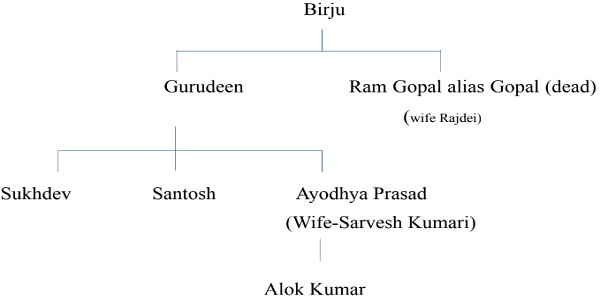
9. It is further submitted that petitioners had come to know about the unregistered Will dated 25.07.2003 executed by late Ram Gopal in favour of Gurudeen, Santosh Kumar and Ayodhya Prasad. After the demise of Ayodhya Prasad, petitioner nos. 2 and 3 being the wife and son of late Ayodhya Prasad respectively step into the shoes of late Ayodhya Prasad.
10. After getting the copy of unregistered Will dated 25.07.2003, the petitioners moved an application before the Tehsildar under Section 34 of the U.P. Revenue Code, 2006 (hereinafter referred to as, the Code, 2006) for mutation of their names in the revenue records in place of late Ram Gopal. The application preferred by the petitioners was rejected by the Tehsildar by order dated 21.01.2013. Against the said order, petitioners had preferred a revision which was also dismissed by judgment and order dated 11.03.2014. Assailing the said order, petitioners had approached this Court by filing Writ Petition No. 10446 (M/B) of 2012, which was also dismissed by this Court by its judgment and order dated 19.12.2012 with liberty to the petitioners to avail appropriate alternative remedy for the claim of title.
11. It is further submitted that after the judgment of this Court dated 19.12.2012, petitioners had preferred a Suit under Section 229 (B) of the Uttar Pradesh Zamindari Abolition and Land Reforms Act, 1950 (hereinafter referred to as, the Act, 1950), claiming their rights on the basis of unregistered Will dated 25.07.2003. The Suit of the petitioners was dismissed by judgment and order dated 13.10.2014. Against the said order, the petitioners filed a First Appeal under Section 331 of the Act, 1950 with a specific pleading therein that the petitioners had filed only four documents before the Tehsildar and no unregistered Will was produced before the Tehsildar but the Tehsildar passed the order by referring some unregistered Will. The said Appeal preferred by the petitioners was rejected/dismissed by the judgment and order dated 18.12.2014. Against the judgment and order passed in the First Appeal, the petitioners preferred a Second Appeal under Section 331 (4) of the Act, 1950, which was also dismissed by impugned order dated 28.03.2024 and thus, feeling aggrieved, the present petition has been filed before this Court impugning the orders passed.
12. It is further submitted that the Courts below had failed to appreciate or had ignored the fact that the petitioners had never filed any copy of unregistered Will before the Tehsildar but the findings were recorded by the Tehsildar in his order dated 21.01.2013 regarding the unregistered Will, all the Courts below had decided the cases against the petitioners on the basis of findings given by the Tehsildar in the order dated 21.03.2013 related to the unregistered Will, which was neither filed by the petitioners nor claim was on the basis of any unregistered Will.
13. It is further submitted that the unregistered Will produced by the petitioners in the First Appeal filed under Section 331of the Act, 1950 was never proved and the findings have been given by the Court up to the stage of Second Appeal, whereas it is necessary that if any document had been relied by the petitioners then it should be proved hence, the orders passed against the petitioners are bad in the eyes of law and are liable to be quashed.
14. On the other hand, Shri Hemant Kumar Pandey, learned Standing Counsel and Shri Anshuman Singh, learned Counsel for the respondent no. 9 have submitted that the petitioners since the very beginning playing fraud with the Court by taking different stands before the different Courts or the authorities.
15. It is further submitted that the petitioners had produced two forged unregistered Wills of the same date and when the first unregistered Will was not accepted by the Tehsildar in the proceedings under Section 34 of the Act, 2006 preferred by the petitioners by assigning reasons for not accepting the unregistered Will. Thereafter the petitioners produced a second unregistered Will of the same date removing all the defects and came forward with a case that before Tehsildar they had not filed any unregistered Will on which the findings were given by the Tehsildar and that too, the said objection or ground was taken for the first time at the stage of first appeal preferred against the judgment and order passed under Section 229-B of the Act, 1950 and prior to that, at no point of time, the petitioners had raised such ground or plea in any of the proceedings.
16. It is further submitted that the petitioners have intentionally not enclosed copy of revision preferred against the judgment and order dated 21.01.2013 passed by the Tehsildar and the reason is obvious that in the said revision, the petitioners had not raised any such plea which was taken at the time of filing of first appeal. Copy of revision has been placed by the respondent no. 9 before this Court by filing a short counter affidavit as annexure no. C.A.-2 of the said affidavit.
17. Learned counsel for the petitioners has also produced the certified copy of the revision, which has also been taken on record as is mentioned in preceding paragraph of the judgment.
18. It is further submitted that the petitioners are trying to grab the property of widow lady i.e. their aunt, aunt-in-law, aunt grandmother of the petitioners respectively.
19. After hearing learned counsel for the parties and going through the record of the case, it is an undisputed fact between the parties that the dispute involved in the present writ petition is with regard to Plot Nos. 242/0.5369, 245M/0.0060, 261M/0.039, 262M/0.0080 and 5/0.264 situated at Village Kisunpur Ram Chandar, Pargana & Tehsil Sadar, District Rae Bareli belonged to late Ram Gopal, who was the uncle of petitioner no. 1, uncle -in-law of the petitioner no. 2 and petitioner no. 3 is the grandson of brother of late Ram Gopal.
20. The issue which is to be adjudicated in the present case is that whether as per petitioners that they had never filed any unregistered Will before the Tehsildar and in absence of any unregistered Will filed by them, how the findings were given by the Tehsildar on the unregistered Will dated 25.07.2003 and on the basis of which, all the courts had drawn inference against the petitioners and not believed the unregistered Will of the same date. For adjudicating these points, it is necessary to reproduce certain documents.
21. Firstly, para no. 5 of the application preferred by the petitioners under Section 34 of the Code, 2006, before the Tehsildar. The said paragraph is quoted hereinbelow:-
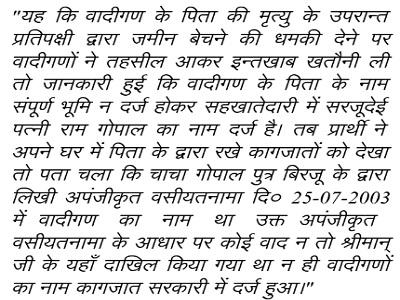
22. The revision preferred by the petitioners against the judgment and order of the Tehsildar dated 21.01.2013, which is filed as Annexure No. S.C.A. 2 of the short counter affidavit filed on behalf of respondent no. 9 after tallying with the certified copy of the same provided by learned counsel for the petitioners. The same is quoted hereinbelow:-
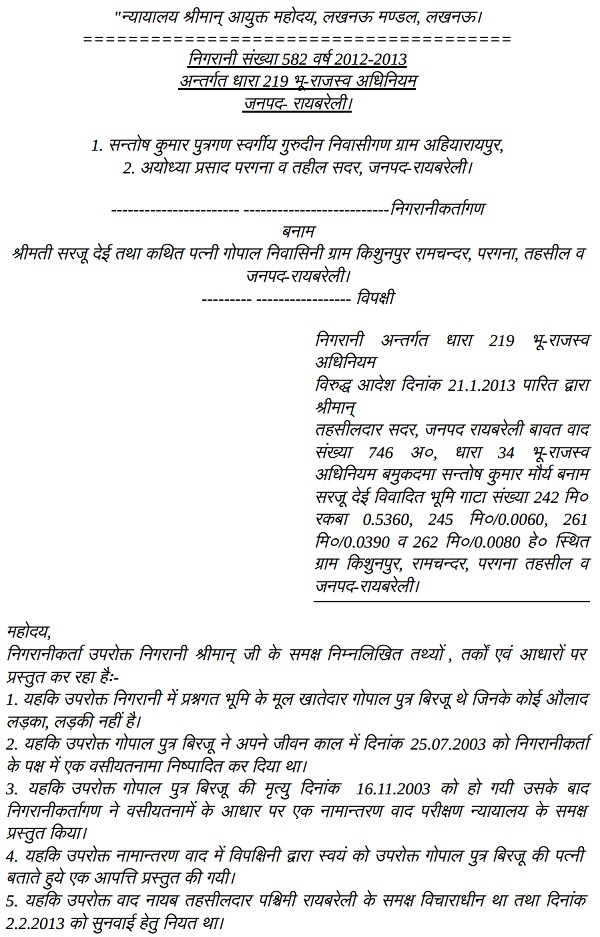
–
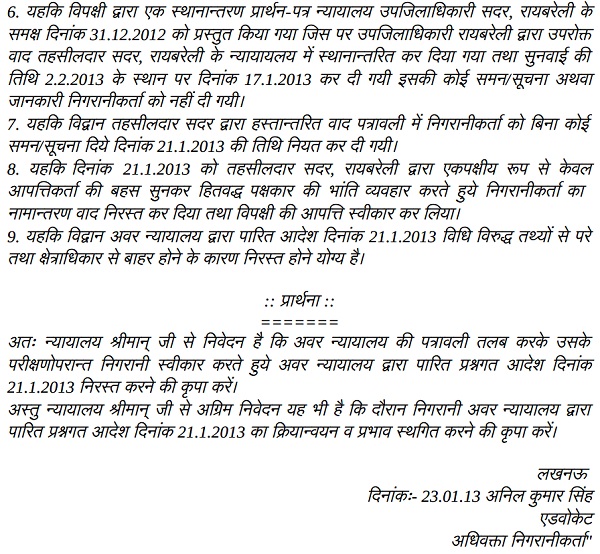
23. Paragraph no. 8 of the suit filed by the petitioners under Section 229-B of the Act, 1950, which is quoted hereinbelow:-
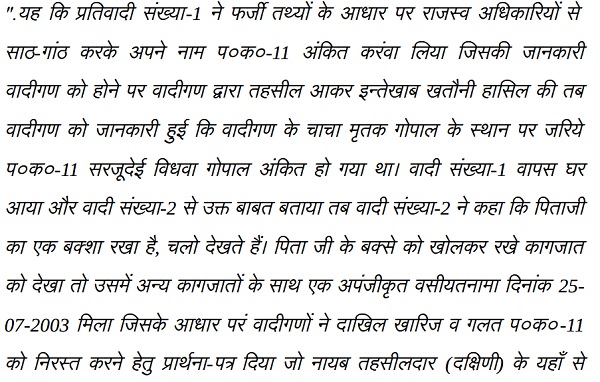
–

24. Uptill this stage, the petitioners had not come with a case before any of the courts that they had not filed any copy of the unregistered Will dated 25.07.2003 before the Tehsildar. For the first time, the plea or the ground was taken in the first appeal preferred by the petitioners against the judgment/order passed under Section 229-B of the Act, 1950 that they had filed only four documents before the Tehsildar. The relevant extract of the appeal preferred by the petitioner is quoted hereinbelow:-
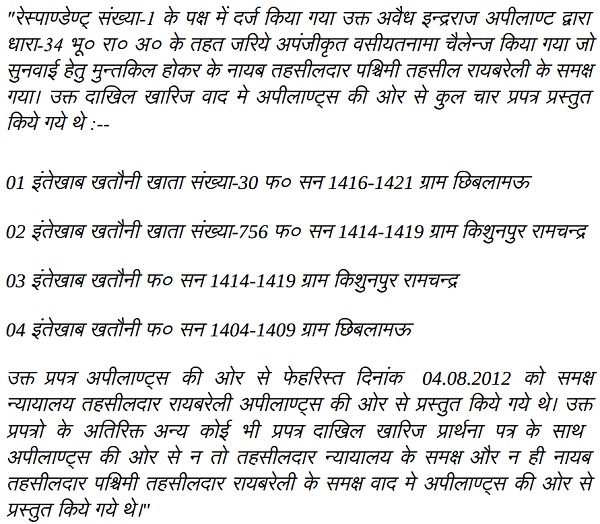
25. From the above mentioned relevant paragraphs quoted from the application, memo of revision and memo of appeal, it is clear that the petitioners had never ever taken this ground before any authority or the court that no unregistered Will was filed by the petitioners before the Tehsildar in the proceedings under Section 34 of the Act, 2006.
26. The petitioners, when they had come to know that they would not succeed then for the first time in the first appeal had taken a case or ground that before the Tehsildar, no unregistered Will was filed and also mentioned four documents which were filed by the petitioners and produced another unregistered Will of the same date by rectifying the mistakes pointed out in the order of Tehsildar dated 21.01.2013. The relevant extract of the said order passed by the Tehsildar dated 21.01.2013 is quoted hereinbelow:-
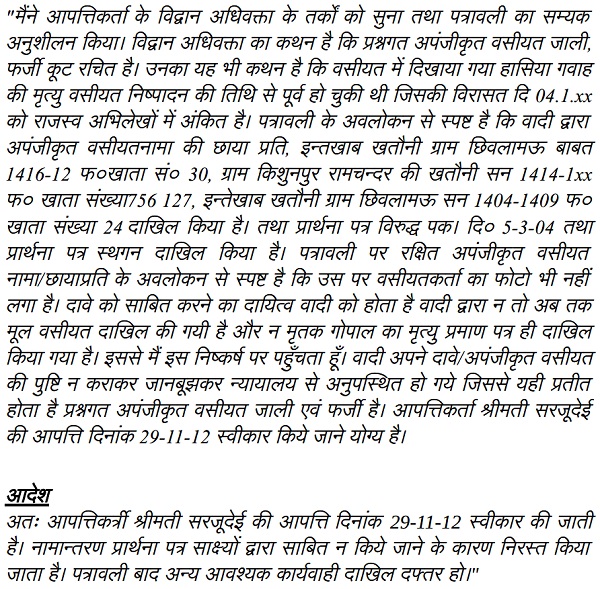
27. Even in the revisional order, there is a specific observation of the revisional authority that the petitioners had relied upon an unregistered Will dated 25.07.2003 which had various discrepancies as pointed out by the Tehsildar even that was never disputed by the petitioners. The relevant extract of the revisional order is quoted hereinbelow:-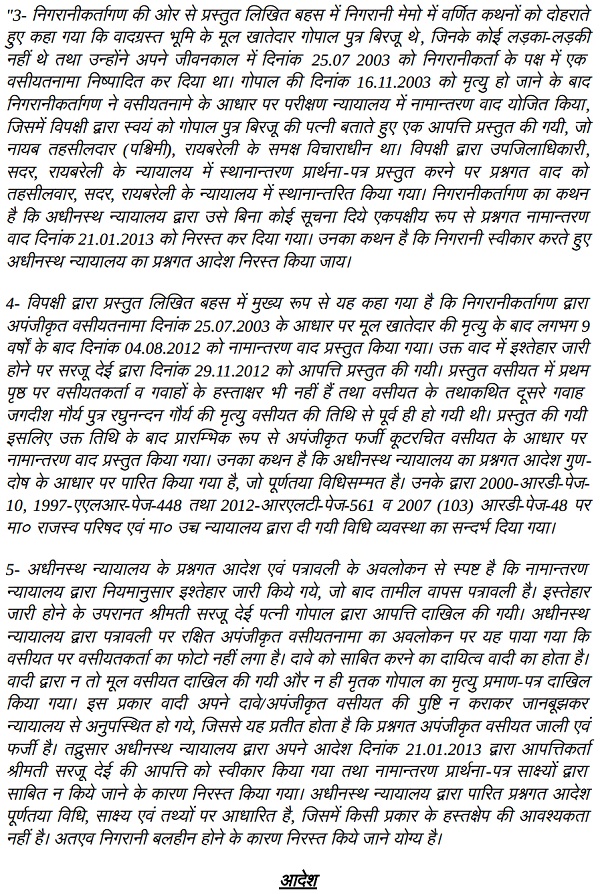
–

28. The Hon’ble Supreme Court in the case of Kishore Samrite Vs. State of U.P. and others reported in Manu/SC/0892/2012 has laid down some principles which would govern the obligations of a litigant while approaching the Court for redressal of any grievance and the consequences of abuse of process of Court. The relevant extract of para no. 29 of the said judgment is being reproduced hereinbelow:-
“29. Now, we shall deal with the question whether both or any of the Petitioners in Civil Writ Petition Nos. 111/2011 and 125/2011 are guilty of suppression of material facts, not approaching the Court with clean hands, and thereby abusing the process of the Court. Before we dwell upon the facts and circumstances of the case in hand, let us refer to some case laws which would help us in dealing with the present situation with greater precision. The cases of abuse of the process of court and such allied matters have been arising before the Courts consistently. This Court has had many occasions where it dealt with the cases of this kind and it has clearly stated the principles that would govern the obligations of a litigant while approaching the court for redressal of any grievance and the consequences of abuse of the process of court. We may recapitulate and state some of the principles. It is difficult to state such principles exhaustively and with such accuracy that would uniformly apply to a variety of cases. These are:
(i) Courts have, over the centuries, frowned upon litigants who, with intent to deceive and mislead the Courts, initiated proceedings without full disclosure of facts and came to the courts with ‘unclean hands’. Courts have held that such litigants are neither entitled to be heard on the merits of the case nor entitled to any relief.
(ii) The people, who approach the Court for relief on an ex parte statement, are under a contract with the court that they would state the whole case fully and fairly to the court and where the litigant has broken such faith, the discretion of the court cannot be exercised in favour of such a litigant.
(iii) The obligation to approach the Court with clean hands is an absolute obligation and has repeatedly been reiterated by this Court.
(iv) Quests for personal gains have become so intense that those involved in litigation do not hesitate to take shelter of falsehood and misrepresent and suppress facts in the court proceedings. Materialism, opportunism and malicious intent have over-shadowed the old ethos of litigative values for small gains.
(v) A litigant who attempts to pollute the stream of justice or who touches the pure fountain of justice with tainted hands is not entitled to any relief, interim or final.
(vi) The Court must ensure that its process is not abused and in order to prevent abuse of the process the court, it would be justified even in insisting on furnishing of security and in cases of serious abuse, the Court would be duty bound to impose heavy costs.
(vi) …….
(vii) ………
(emphasis supplied)
29. In view of the facts and circumstances of the present case, it is found that the petitioners had filed false affidavits before the courts just to grab the property of a widow lady and mislead the Courts at every stage, even in the present writ petition.
30. The petitioners are not only cheating or deceiving the widow lady that is the wife of Late Ram Gopal but also misleading the Courts and concealed the relevant facts by not enclosing the copy of revision.
31. Petitioners had filed the copy of unregistered Will dated 25.07.2003 which was duly considered by the Tehsildar and pointed out the shortcomings due to which it was not accepted while rejecting the claim of the petitioners. Petitioners in the revision had not taken this ground that they had not filed any unregistered Will or the unregistered Will which was filed by the petitioners is not the same which was referred in the order of Tehsildar. This shows that the second unregistered Will of the same date by rectifying all the short comings as pointed out by the Tehsildar is nothing but amounts to cheating, playing fraud, misleading the Courts and also amounts to abuse of process of the Court. The unregistered Will which was produced by the petitioners before the Tehsildar was not found to be acceptable by the Tehsildar then there is no question to prove the second unregistered Will prepared by the petitioner afterthought.
32. It is also the petitioners, who had not placed any document or application at the appellate stage for accepting the additional documents as an evidence by filing a second unregistered Will prepared afterthought of the same date under Order XLI Rule 27 C.P.C.
33. It was the duty of the petitioners to prove the unregistered Will which they had not even tried since it appears that the petitioners were aware that the unregistered Will was not genuine and they would not able to prove it.
34. In view of the aforesaid facts, circumstances and discussion made hereinabove, it is found that there is no illegality in the impugned orders dated 28.03.2024 passed by the respondent no. 1, impugned order dated 18.12.2014 passed by the respondent no. 2, impugned order dated 13.10.2014 passed by the respondent no. 5, impugned order dated 11.03.2014 passed by the respondent no. 3 and judgment and order dated 21.01.2013 passed by the respondent no. 5, thus, no interference is called for.
35. Writ petition is devoid of merits hence, dismissed with a cost of Rs. 50,000/- (Rs. Fifty Thousand), in view of their conduct which resulted in misuse of process of law. The amount of cost is to be deposited before the Senior Registrar of this Court within a period of three months from today. Failing which, the Senior Registrar is directed to require the authorities to recover the same as arrears of land revenue.





